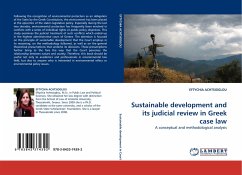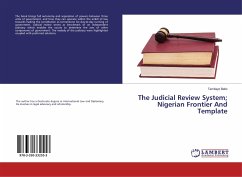Following the recognition of environmental protection as an obligation of the State by the Greek Constitution, the environment has been placed at the epicentre of the state's legislative policy. Especially during the last two decades, environmental protection has frequently been involved in conflicts with a series of individual rights or public policy objectives. This study examines the judicial treatment of such conflicts which ended up in the highest administrative court of Greece. The attention is focused on the principle of sustainable development that the Court employs in its reasoning, on the methodology followed, as well as on the general theoretical presumptions that underlie its decisions. These presumptions further bring to the fore the way that the Court perceives the relationship between nature and society. Therefore, this book should be useful not only to academics and professionals in environmental law field, but also to anyone who is interested in environmental ethics or environmental policy issues.
Bitte wählen Sie Ihr Anliegen aus.
Rechnungen
Retourenschein anfordern
Bestellstatus
Storno








